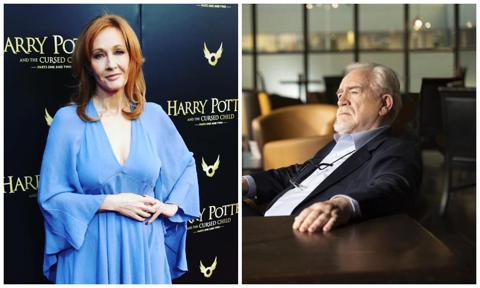
Succession star Brian Cox seems to have made a case for Harry Potter author J. K. Rowling’s contentious views on the transgender community, admitting that he thinks the author has been unfairly treated by the media and her fans.
Rowling has been the centre of an ongoing controversy that began when the author began expressing anti-transgender sentiments on her social media platform. Many fans have condemned the Harry Potter creator, who has only doubled down in her stance in recent years, going so far as to pen a 2020 essay defending her previous statements.
According to The Hollywood Reporter, the Scottish actor, who is best known for playing patriarch Logan Roy on HBO’s Succession, recently appeared on the BBC talk program Sunday With Laura Kuenssberg and expressed his support for the trans community. Cox discussed how proud he was that Scotland took a step forward in the right direction by voting to approve legislation allowing transgender people to change their legal gender without requiring any medical diagnosis. The actor was then probed further to share his thoughts on Rowling, who publicly backed opposition to the Scottish legislation.
“I don’t like the way she’s been treated, actually,” Cox said. “I think she’s entitled to her opinion; she’s entitled to say what she feels. As a woman, she’s very much entitled to say what she feels about her own body, and there’s nobody better to say that, as a woman.”
The actor continued, “So, I do feel that people have been a bit high-and-mighty about their own attitude towards J.K. Rowling, quite frankly.” This is not the first time Cox has spoken out in support of Rowling. The actor had also addressed the public outcry against Rowling as “deeply unjust” in May 2022.
Rowling, who was once widely beloved and celebrated for creating the iconic Wizarding World franchise, has turned into somewhat of a controversial figure online in recent years after expressing comments that have been criticised as transphobic. These views have placed her in the bad books of a large chunk of her fan base, with many followers publicly rescinding support for current and future Harry Potter projects on social media because of the author’s comments.
What does the cast of Harry Potter have to say about the Rowling backlash?
Since Rowling first broached the issues related to gender, trans people and biological sex, and made her scandalous opinions known to the public, actors who starred in Warner Bros.‘ massively-successful Harry Potter film franchise have been repeatedly asked to comment on the author’s views.
In the wake of Rowling’s current reputation, many HP alumni, including Daniel Radcliffe and Emma Watson, voiced their disappointment in the author and subsequently distanced themselves from her. On the other hand, some like Helena Bonham Carter and Ralph Fiennes chose to defend the author.
However, some HP actors chose to stay away from the debate and avoided commenting on the matter altogether. Jason Isaacs, who played Lucius Malfoy in the films, stated that he will neither defend nor oppose the best-selling author until he has had a chance to sit down and speak with her about her views.
“I don’t want to get drawn into the trans issues, talking about them, because it’s such an extraordinary minefield,” Isaacs said in January 2022. “So for all that she has said some very controversial things, I was not going to be jumping to stab her in the front -- or back -- without a conversation with her, which I’ve not managed to have yet.”
Ralph Fiennes, who played the legendary role of Lord Voldemort in the movies, also defended Rowling, stating that the “verbal abuse” she’s received across social media is “appalling.” Fiennes described that while he understands some fans‘ anger, he believes the disdain expressed towards Rowling is unjustified.
“J.K. Rowling has written these great books about empowerment, about young children finding themselves as human beings,” Fiennes said. “It’s about how you become a better, stronger, more morally centred human being. The verbal abuse directed at her is disgusting, it’s appalling.”
While there’s still a lot up for debate, the solution to the controversy is to start with eliminating hateful rhetoric towards either women or trans people (or just human beings in general)—that’s a good start, we’d say.
- Quick links
- JK Rowling
- Brian Cox
- succession
- Harry Potter






